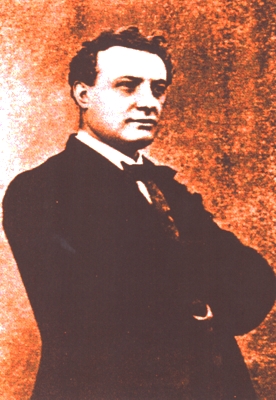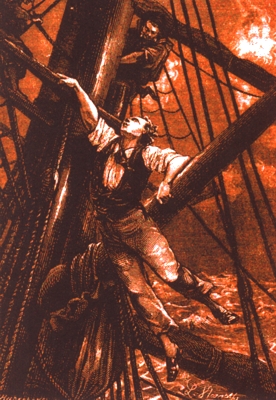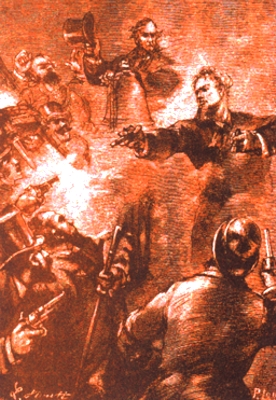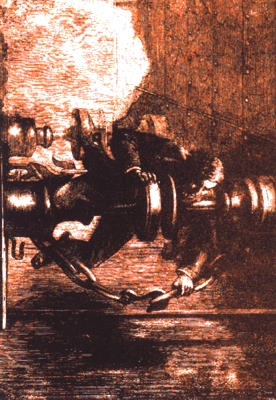![]()
| Proposal 2, Page 4 (continued from Page 3) | ||
| THE CHARACTERS | ||
| Jules Verne | ||
| The
Jules Verne of
“Secret Adventures” is a young man in his late twenties who's
above all an enthusiast for ideas, for people, for possibilities. When
he hears of something new he responds to it with his whole being, either
positively or negatively. There are no half measures with him.
He's always burning with elation or plunged into the depths of despair, and he lets you know in no uncertain terms which of these states he's in. He lives in a world heightened by the colours of his imagination: a more exciting, vibrant world than most of us experience. A world, under the impact of Jules’ enthusiasm, what COULD BE often becomes what IS.
When we first meet Jules, he's still mired in the facts he's been
accumulating (on little note-cards) all his life, still afraid to let go
of everyday reality and let his imagination take wing. But under the
influence of the devil-may-care Phileas Fogg he learns to use his vision
to make the world the kind of place he wants it to be. |
 |
|
| Needless
to say, Jules is a romantic: he has a tendency to fall in love on the
slightest provocation. But somehow his youthful impetuosity or fate or
circumstance tend to come between him and the woman of his dreams, and
his heart is available to be swept away by the enchantress he meets on
his next adventure.
He's also ambitious (and quite endearingly fond of money). He sees everything that happens to him as raw material for new best-sellers - and he tends to assume everyone involved will be delighted to be turned into fiction under his pen, an assumption which is not always correct Jules has an inventive mind, but he's not a scientist He can conceive of wonderful things being built, but not necessarily build them himself. He is, however, very good at inspiring others to create things they might otherwise have only dreamt of. When circumstances force him to try his hand at actually putting machines together without assistance, the results aren't always entirely reliable. But they ARE always exciting. |
 |
|
| Phileas Fogg | ||
| Phileas
Fogg comes from a highly respectable banking family, and is travelling
the world to escape the stultifying dullness of the society that wants
to claim him and the women who want to many him. Older and wiser than
Verne, Fogg is a man of the world, a shrewd judge of people and
situations.
He's been everywhere, done everything: and become a little cynical. His weakness is his gambling streak - his need to risk everything whenever the opportunity arises - and sometimes lose it all. But knowing this weakness he's adapted his life to cope with it and cheerfully accepts vast losses and vast gains without blinking an eye. What Fogg likes about Verne is his warmth and enthusiasm. Verne's puppy-dog excitement about life and its possibilities are the perfect counter-balance to Fogg's darker view: and Fogg is genuinely fond of Verne. In addition to which, Jules often leads Fogg into situations which are perfect for a gambler -indeed, into which, only a gambler would venture. |
 |
|
| Being with Verne, Fogg sometimes remarks, is like entering a game of chance for which no rules have been invented. And because Fogg is a crack shot, an expert swordsman and a first class boxer, it's often only his strength and ability that ensures the exciteable young author survives to fight another day. | ||
|
Passepartout |
||
|
Fogg's manservant Passepartout is an excitable, accident-prone
English-mangling Frenchman who tries, often unsuccessfully, to provide
an element of order and stability in Fogg's chaotic life. His master
might be racing to reach the
North Pole or ballooning across the Atlantic, but Passepartout will try
to ensure Fogg's trousers are always pressed and the champagne is always
properly iced. Indeed, concentrating on this sort of thing is often
Passepartout's only way of calming himself in the face of all the
dangers into which Phileas and Jules lead him. Passepartout, like Verne, is a romantic: he has a tendency to fall in love with somebody in nearly every adventure - and only the fact that Fogg and Verne move on so swiftly and unpredictably prevents him from being caught in the web of matrimony. Passepartout is usually the voice of common sense or caution. Whereas Jules will be carried away by enthusiasm and Fogg is willing to try anything with a promise of excitement, Passepartout has a dream of the quiet life, with the opportunity to iron Mr Fogg's newspaper before delivering it with his morning tea, and chat in a leisurely manner with the downstairs maid. |
 |
|
| Whenever he gets the chance, he gently tries to nudge Phileas Fogg back towards staid respectability - and may succeed, temporarily, until Jules Verne plunges them into a new adventure. | ||
Continued on Page 5